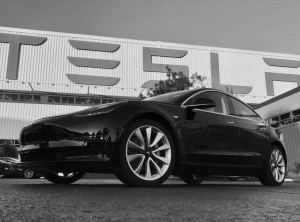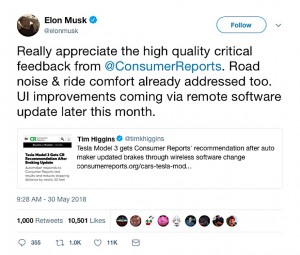
Consumer Reports said it would, and it did and now Elon Musk is happy.
The consumer advocacy magazine revised its rating on the new Tesla Model 3. After initially electing to not recommend the new four-door EV – Tesla’s ticket to mainstream success – the publication now recommends the car.

The about-face came after its initial review of the vehicle where it “found plenty to like about the luxury compact sedan” that features “record-setting range as well as exhilarating acceleration and handling that could make it a healthy competitor to performance-oriented cars such as BMW’s 3 Series and the Audi A4.”
However, it quickly pointed a few flaws in the new model, primarily long stopping distances in the magazine’s emergency braking test and difficult-to-use controls, that prevented it from earning a recommendation.
(Tesla Model 3 not faring will in media spotlight. Click Here for the story.)
The Tesla’s stopping distance of 152 feet from 60-to-0 mph was “far worse than any contemporary car we’ve tested.” In fact, it was about 7 feet longer than of the Ford F-150. Tesla offered up its own results saying that using the same tires that Consumer Reports model was equipped with that it performed the same test in an average of 133 feet.

This caught the attention of Musk, who quickly defended the Model 3’s performance, by suggesting the magazine had an early production model of the vehicle.
“With further refinement, we can improve braking distance beyond initial specs. Tesla won’t stop until Model 3 has better braking than any remotely comparable car,” Musk tweeted.
After Musk’s tweet, the magazine agreed to retest the Model 3 after an over-the-air update from the Tesla.
(Click Here for more about Musk looking beyond Model 3 problems, but creating some headache in the process.)
“If Tesla can update the brakes over the air – an industry first – we’d be happy to retest our Model 3,” said Jake Fisher, Consumer Reports’ director of automotive testing.

Tesla did. And so did the magazine, thus the change. In an interview with USA Today, Fisher said Musk’s public criticism of last week’s review did not affect the publication’s shift, and during the subsequent hour-long chat between Musk and Fisher “there was no pressuring at all.”
“There are still other flaws with the vehicle,” Fisher said. “Those have not necessarily been addressed. It’s not the top in its category, but it’s certainly a vehicle that scores high enough to recommend.”
Don’t worry, Musk has those other issues, such as road noise and ride quality, in his sights, according to a new tweet.
(To see more about Tesla’s California plant shutting down for six days, Click Here.)
“Really appreciate the high quality critical feedback from @ConsumerReports. Road noise & ride comfort already addressed too. UI improvements coming via remote software update later this month,” he tweeted.








“If Tesla can update the brakes over the air…” Am I to understand that the brakes are controlled by a computer? If so, what is the likelihood of the system being hacked, with undesirable results?
Hacking a vehicle appears to be more difficult than a computer for a variety of reasons, including unique software v a common base, ie Windows of iOS. Also, more difficult to access. But hacking has become a major concern of automakers and regulators.
Paul E.